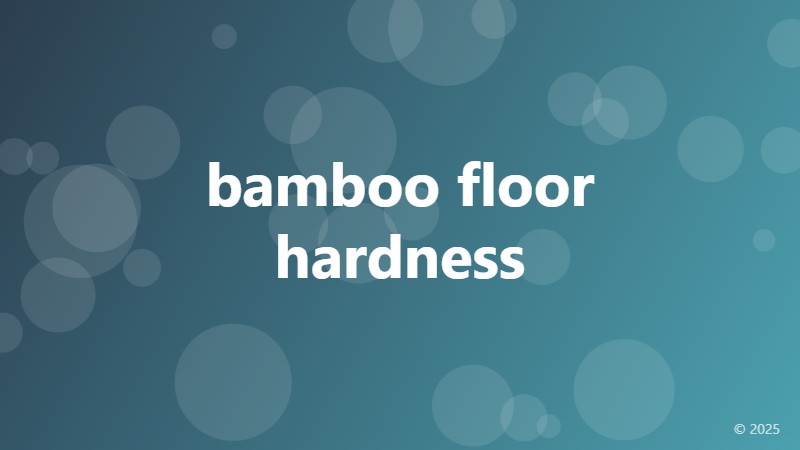bamboo floor hardness

Understanding Bamboo Floor Hardness
Bamboo flooring has gained popularity in recent years due to its unique combination of sustainability, durability, and aesthetic appeal. One of the key factors to consider when choosing a bamboo floor is its hardness, as it directly affects the floor's performance and lifespan. In this article, we'll delve into the world of bamboo floor hardness, exploring what it means, how it's measured, and what you need to know when selecting the perfect bamboo floor for your space.
The Janka Hardness Scale
The Janka hardness scale is the industry standard for measuring the hardness of wood and bamboo flooring. Developed by Gabriel Janka in the 1900s, this scale determines the resistance of a wood or bamboo sample to denting and wear. The test involves pressing a 0.444-inch steel ball into the sample until it embeds halfway, with the resulting pressure measured in pounds per square inch (psi). The higher the Janka rating, the harder the material.
Bamboo Floor Hardness: What's the Average?
Bamboo flooring typically ranges from 1,300 to 1,800 on the Janka scale, with some species reaching as high as 2,000 psi. For comparison, red oak, a popular hardwood flooring option, has a Janka rating of around 1,290 psi. This means that bamboo flooring is generally harder and more resistant to scratches and dents than many traditional hardwood options.
Factors Affecting Bamboo Floor Hardness
Several factors can influence the hardness of bamboo flooring, including:
- Species: Different bamboo species exhibit varying levels of hardness, with some being naturally harder than others.
- Moisture content: Bamboo flooring with higher moisture content may be softer and more prone to scratches than flooring with lower moisture content.
- Manufacturing process: The way bamboo flooring is manufactured can impact its final hardness, with some manufacturers using more advanced techniques to enhance durability.
What to Look for When Choosing a Bamboo Floor
When selecting a bamboo floor, look for products with high Janka ratings (above 1,500 psi) for added durability and resistance to wear. Additionally, consider the following factors:
- Thickness: Thicker bamboo flooring tends to be harder and more durable than thinner options.
- Finish: A high-quality finish can enhance the overall hardness and scratch resistance of the flooring.
- Manufacturer reputation: Choose a reputable manufacturer that uses sustainable, eco-friendly practices and advanced manufacturing techniques to ensure a high-quality, durable bamboo floor.
By understanding bamboo floor hardness and considering the factors mentioned above, you can make an informed decision when selecting the perfect bamboo floor for your space. With its unique blend of sustainability, durability, and aesthetic appeal, bamboo flooring is an excellent choice for homeowners looking for a high-quality, eco-friendly option.